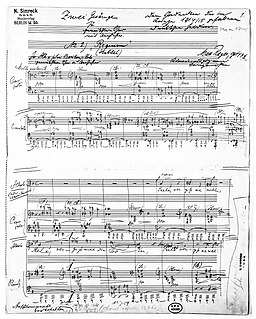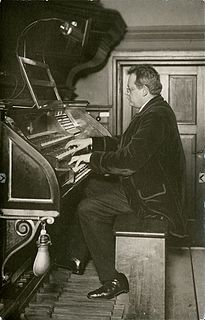Johann Pachelbel was a German composer, organist, and teacher who brought the south German organ schools to their peak. He composed a large body of sacred and secular music, and his contributions to the development of the chorale prelude and fugue have earned him a place among the most important composers of the middle Baroque era.

Johann Baptist Joseph Maximilian Reger, commonly known as Max Reger, was a German composer, pianist, organist, conductor, and academic teacher. He worked as a concert pianist, as a musical director at the Leipzig University Church, as a professor at the Royal Conservatory in Leipzig, and as a music director at the court of Duke Georg II of Saxe-Meiningen.
The organ repertoire is considered to be the largest and oldest repertory of all musical instruments. Because of the organ's prominence in worship in Western Europe from the Middle Ages on, a significant portion of organ repertoire is sacred in nature. The organ's suitability for improvisation by a single performer is well adapted to this liturgical role and has allowed many blind organists to achieve fame; it also accounts for the relatively late emergence of written compositions for the instrument in the Renaissance. Although instruments are still disallowed in most Eastern churches, organs have found their way into a few synagogues as well as secular venues where organ recitals take place.

Passacaglia and Fugue in C minor is an organ piece by Johann Sebastian Bach. Presumably composed early in Bach's career, it is one of his most important and well-known works, and an important influence on 19th and 20th century passacaglias: Robert Schumann described the variations of the passacaglia as "intertwined so ingeniously that one can never cease to be amazed."

The Variations and Fugue on a Theme by Mozart, Op. 132, is a set of variations for orchestra composed in 1914 by Max Reger; the composer conducted the premiere in Berlin on 5 February 1915. He later produced a version for two pianos, Op. 132a, where the Variation 8 ("Moderato") is completely different.

Prelude and Fugue in A minor, BWV 543 is a piece of organ music written by Johann Sebastian Bach sometime around his years as court organist to the Duke of Saxe-Weimar (1708–1713).

Wilhelm Reinhard Berger was a German composer, pianist and conductor.

"Wie schön leuchtet der Morgenstern" is a Lutheran hymn by Philipp Nicolai written in 1597 and first published in 1599. It inspired musical settings through centuries, notably Bach's chorale cantata Wie schön leuchtet der Morgenstern, BWV 1, but also vocal and instrumental works by Baroque composers, Peter Cornelius, Felix Mendelssohn, Max Reger, Hugo Distler, Ernst Pepping, Mauricio Kagel and Naji Hakim.

Max Reger's 1915 Requiem, Op. 144b, is a late Romantic setting of Friedrich Hebbel's poem "Requiem" for alto or baritone solo, chorus and orchestra. It is Reger's last completed work for chorus and orchestra, dedicated in the autograph as Dem Andenken der im Kriege 1914/15 gefallenen deutschen Helden.

Gabriel Dessauer is a German cantor, concert organist, and academic. He was responsible for the church music at St. Bonifatius, Wiesbaden from 1981 to 2021, conducting the Chor von St. Bonifatius until 2018. He is an internationally-known organ recitalist, and was an organ teacher on the faculty of the Hochschule für Musik Mainz. In 1985, he founded the German-English project choir, Reger-Chor. He has lectured at international conferences, especially about the music of Max Reger, who was a member of the St. Bonifatius parish.

Der 100. Psalm, Op. 106, is a composition in four movements by Max Reger in D major for mixed choir and orchestra, a late Romantic setting of Psalm 100. Reger began composing the work in 1908 for the 350th anniversary of Jena University. The occasion was celebrated that year with the premiere of Part I, conducted by Fritz Stein on 31 July. Reger completed the composition in 1909. It was published that year and premiered simultaneously on 23 February 1910 in Chemnitz, conducted by the composer, and in Breslau, conducted by Georg Dohrn.

Three chorale fantasias, Op. 52, are chorale fantasias for organ by Max Reger. He composed the fantasias on three chorales in September 1900: Phantasie über den Choral "Alle Menschen müssen sterben", Phantasie über den Choral "Wachet auf, ruft uns die Stimme" and Phantasie über den Choral "Halleluja! Gott zu loben bleibe meine Seelenfreud". They were all first performed individually by Reger's friend Karl Straube, and were first published by Breitkopf & Härtel.

The Max-Reger-Institute (MRI) is a musicological research institute and archive in Karlsruhe, Germany, dedicated to the work of the composer Max Reger, a representative of German music around the turn of the 20th century. An associated foundation, the Elsa-Reger-Stiftung, is named after his wife, Elsa Reger, who founded the foundation and the institute. It has a substantial archive of manuscripts and documents related to Reger.

Zwei Choralphantasien, Op. 40, are fantasias for organ by Max Reger. He composed the fantasias in 1899 on two chorales: "Wie schön leucht't uns der Morgenstern" and "Straf mich nicht in deinem Zorn" They were published by Musikverlag Josef Aibl in Munich in May 1900.

Zwölf Stücke, Op. 65, is a group of twelve pieces for organ by Max Reger, composed in Munich in 1902. They were published by C. F. Peters in Leipzig in August of that year, in two books (Heft) of six pieces each.

Zwölf Stücke, Op. 80, is a group of twelve pieces for organ by Max Reger. He composed them in Munich in 1902 and 1904. They were published by C. F. Peters in Leipzig in September 1904.

Ein' feste Burg ist unser Gott, Op. 27, is a chorale fantasia for organ by Max Reger. He composed it in 1898 on Luther's hymn "Ein feste Burg ist unser Gott". The full title is Phantasie über den Choral "Ein' feste Burg ist unser Gott".

Sieben Stücke für Orgel, Op. 145, is a collection of seven compositions for organ by Max Reger. He composed the work in three groups in 1915 and 1916. The titles of seven individual character pieces reflect aspects of World War I and Christian feasts. The compositions are based on traditional German hymns, sometimes combining several in one piece. Reger's last work for organ, it was published, again in three installments, in 1915 and 1916.

Heinz Wunderlich was a German organist, academic, and composer. He was known for playing the organ works of Max Reger. He studied in Leipzig with Karl Straube, a friend of Reger. Wunderlich worked as both a church musician and academic in Halle until 1957 when he fled to West Germany and became a church musician and academic in Hamburg. He toured internationally and attracted students from many countries to study with him in Hamburg. After retiring from teaching, he went on to more compositions.

Introduction, Passacaglia and Fugue in E minor, Op. 127, is an extended composition for organ by Max Reger, composed in 1913 and dedicated to Karl Straube who played the premiere in Breslau on 24 September. It was published in November that year in Berlin by Bote & Bock.















